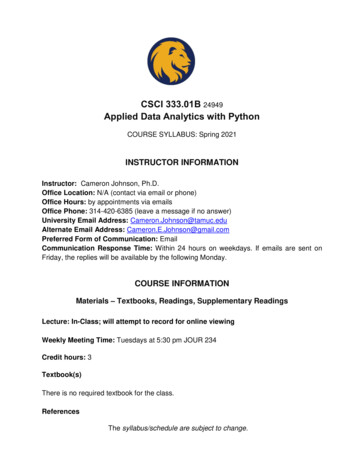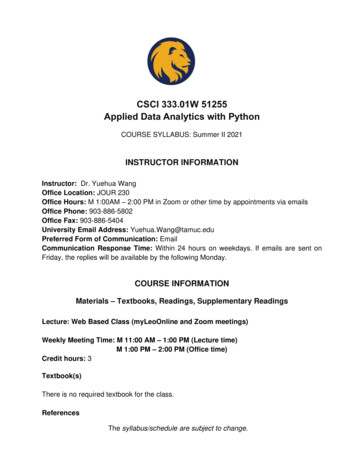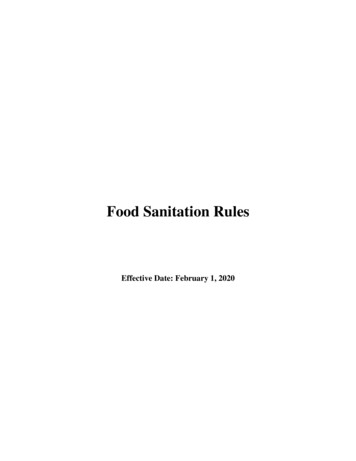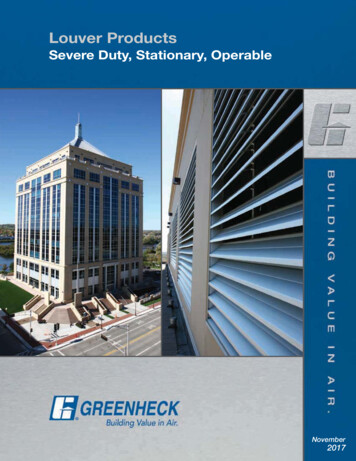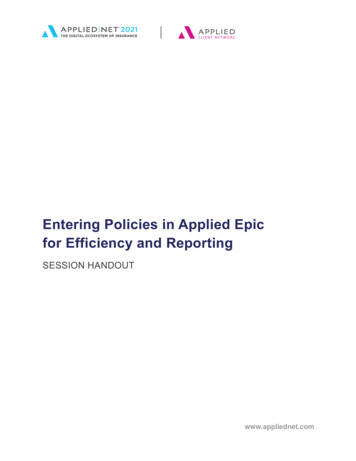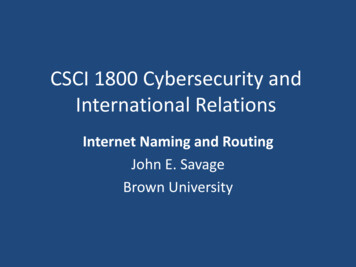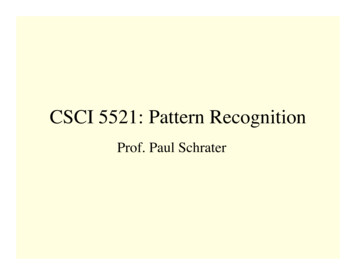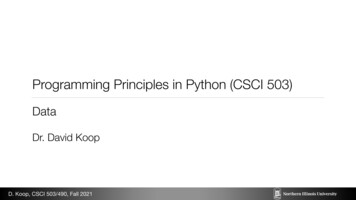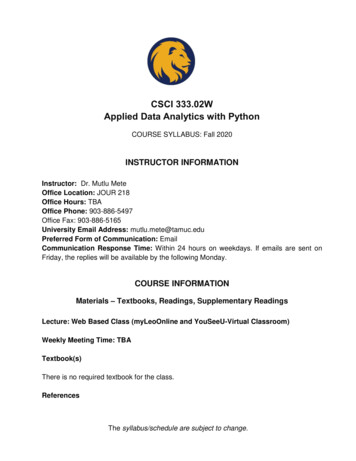
Transcription
CSCI 333.02WApplied Data Analytics with PythonCOURSE SYLLABUS: Fall 2020INSTRUCTOR INFORMATIONInstructor: Dr. Mutlu MeteOffice Location: JOUR 218Office Hours: TBAOffice Phone: 903-886-5497Office Fax: 903-886-5165University Email Address: mutlu.mete@tamuc.eduPreferred Form of Communication: EmailCommunication Response Time: Within 24 hours on weekdays. If emails are sent onFriday, the replies will be available by the following Monday.COURSE INFORMATIONMaterials – Textbooks, Readings, Supplementary ReadingsLecture: Web Based Class (myLeoOnline and YouSeeU-Virtual Classroom)Weekly Meeting Time: TBATextbook(s)There is no required textbook for the class.ReferencesThe syllabus/schedule are subject to change.
In most cases, the instructor’s slides are sufficient for understanding all topics covered bythis course. The following books and websites may be useful as references or tutorials forPython studying.Books:PRIMARY REFERENCE: (available thru tamuc.edu/library) Intro to Python for Computer Science and Data Science: Learning to Program withAI, Big Data and The Cloud by Paul J. Deitel , and Harvey DeitelOTHERS: Python Crash Course, 2nd Edition: A Hands-On, Project-Based Introduction toProgramming by Eric MatthesISBN-10: 1593279280 ISBN-13: 978-1593279288ISBN-13: 978-0135404676 ISBN-10: 0135404673 Practice of Computing Using Python, The, Student Value Edition,3rd Edition,by William F. Punch, and Richard EnbodyISBN-13: 978-0134380315 ISBN-10: 0134380312 Python for Everyone, 2nd Edition by Cay S. Horstmann, Rance D. NecaiseISBN-13: 978-1119056553 ISBN-10: 1119056551 Python for Data Analysis: Data Wrangling with Pandas, NumPy, and IPython 2ndEditionby Wes McKinneyISBN-13: 978-1491957660 ISBN-10: 1491957662 Python for Software Design: How to Think Like a Computer Scientist 1st Editionby Allen B. Downey (Author). Available thon.htmlISBN-13: 978-0521725965 ISBN-10: 0521725968 Automate the Boring Stuff with Python: Practical programming for total beginners byAl Sweigart. Available at https://automatetheboringstuff.com/ISBN-10: 1593275994 ISBN-13: 978-1593275990Websites: Python for beginners: https://www.python.org/about/gettingstarted/ Jython: https://www.jython.org/ Learnpython: https://www.learnpython.org/ Google’s Python Class: https://developers.google.com/edu/python/ The Python Tutorial: https://docs.python.org/3/tutorial/ Tutorialpoint: tware RequiredThe syllabus/schedule are subject to change.
Students may develop your programs on any machine that you like: we encourage you touse your own equipment. We provide instructions for setting up a Python programmingenvironment under Windows, OS X, and Linux.You can use one of the several excellent Python IDEs available, with instructor materialscovering PyCharm and Anaconda that are freely available for academic use and works onthe major computing platforms (Windows, OS X, and Linux)Course DescriptionThis course covers both theoretical and practical aspects of applied data science, analytics,and visualization in Python. We will start from general python programming basics, datastructures, and algorithm design with a heavy emphasis on applying data analysis andvisualization techniques to solve real-world problems in different domains. Topics includedata representation, manipulation and clearing, visualization, regression, convolutional andrecurrent neural networks, reinforcement learning, model development and evaluation withmost up-to-date Python modules and popular toolkits.Prerequisites: COSC 2336Supplementary information for the course is available at D2L. Log on with your Access IDfor class notes, lecture slides, class announcements, the course syllabus, and otherinformation for the course. You will submit your assignments and project and check gradesthere too.Student Learning Outcomes (Should be measurable; observable; use action verbs)This course is similar to an exercise class. You learn new concepts and techniques, andthen, exercise these new-found skills. At the end of the class, students can1) (SLO333.1) Self configure various Python programming environment.2) (SLO333.2) Code, compile, debug, and run Python programs3) (SLO333.3) Learn Python language syntax and fundamental programmingconcepts including variables, control statements, loops, functions, lists, and classes4) (SLO333.4) Use modules and tools to collect, reshape, analysis, and visualize data5) (SLO333.5) Develop programs for various real-world problems by applying datascience6) (SLO333.6) Evaluate data results and make optimal decisions*Note: All background material will be developed and offered in efficient and effectiveways within the course itself and from scratch.The syllabus/schedule are subject to change.
COURSE REQUIREMENTSMinimal Technical Skills NeededUsing computers, operating systems, program compilers, IDE, and Microsoft WordInstructional Methods1. This is a web-enhanced course (using some of the capabilities of myLeo Online butnot set up as a self-directed online course. Instruction will be face-to-face.Assignments and course notes will be available on line. Feedback on assignmentswill also be available on line.2. Student Responsibilities or Tips for Success in the Course3. “All students enrolled at the University shall follow the tenets of common decencyand acceptable behavior conducive to a positive learning environment.” (SeeStudent’s Guide Handbook, Policies and Procedures, Conduct). Talking and otheractivities that distract/disturb others in the class would not be tolerated. Instructorholds the right to ask you leave the classroom anytime based on any of disturbingattitude. Each student should sign the sign-sheet if asked by instructor. Late studentmay not be allowed to participate the lecture.4. Assignments and quizzes will be announced on myLeoOnline. No makeup quizzesor assignments.5. .GRADINGFinal grades in this course will be based on the following scale:GRADING POLICY:A: 100%- 90%B: 89% - 80%C: 79% - 70%D: 69% - 60%F: 59 % - 0%AssessmentsBasis for Evaluation:Assignments 40%Quizzes 40%Final Project 20%Notes:The syllabus/schedule are subject to change.
A. Assignments/Labs:Each week there would be an assignment and/or lab that should be solvedindependently and tightly related to the class materials and topics. Submissions arealways expected to be finished in a good shape by deadlines. All assignment mustbe formally submitted to the assignment folder. Email or any other formats ofsubmissions do not count and will not be graded. If you have difficulty accessing D2Ltemporarily, you can email me your assignment as a proof of on-time submission.However, you still need to upload it to the assignment folder as soon the issue isresolved to receive credit.Neither late assignments nor labs would be allowed without instructor’s permission.The instructor should be prior notified with adequate verifiable documentation (e.g.,medical letters or police reports). For the documentation, it will depend on the type ofproblems that you have experienced. The department and instructor reserve the rightto check on the validity of the documents you submit and reject your requests/claimsdue to the lack of the evidence. Without any valid documentary evidence, a 10% perday late penalty would be applied to submissions including assignments and labs.Submissions will NOT be accepted or even considered more than 4 days after thedue date. If it is the case, a grade of zero will be awarded to the submission or missedwork.B. AttendanceFor the online course, student should make effort to attend the live lecture if possibleor listen to the recorded lecture. Students are required to keep up with class materialsand announcement made during live lectures or via emails, including changes to duedates or assignments. Attendance will be evaluated based on the submission ofassignments and labs.C. QuizzesYou should do your own work on exams, assignments and labs. Copying anotherstudent’s work is not acceptable. Any indication of cheating or plagiarism on anexam/assignment will result in an automatic 0 (zero) for the exam/assignment for allstudents involved. Yet, based on cheating and plagiarism activity in any section ofclass, instructor holds the right to give F grade to the identified student(s). Regardingcodes in assignments, you may be required to explain the code you submitted. Incase of discursive explanation, the instructor holds the right to lower your grade.The syllabus/schedule are subject to change.
All students are expected to be present for all class activities. The instructor shouldbe notified in advance if students will be absent with adequate verifiabledocumentation (e.g., medical letters or police reports). Failure to do so may result inthe student receiving zero for the missed exam.D. Final projectThe final project consists of problems, solutions, source code, and a project report.More details are provided in the final project guideline.E. Bonus creditAccording to the quality, completion, and/or creativity of assignments, labs, andexams, students may be awarded bonus credit in some cases.This is an online class. The D2L portal will be used for information and resource sharing.Assignments will be uploaded to D2L course shell. Students are responsible for obtainingand setting up their D2L account using their TAMUC student login. They need to follow theD2L course shell daily for the course announcements, downloading and uploading theassignments, and other course activities.TECHNOLOGY REQUIREMENTSBrowser supportD2L is committed to performing key application testing when new browser versions arereleased. New and updated functionality is also tested against the latest version ofsupported browsers. However, due to the frequency of some browser releases, D2Lcannot guarantee that each browser version will perform as expected. If you encounterany issues with any of the browser versions listed in the tables below, contact D2LSupport, who will determine the best course of action for resolution. Reported issues areprioritized by supported browsers and then maintenance browsers.Supported browsers are the latest or most recent browser versions that are tested againstnew versions of D2L products. Customers can report problems and receive support forissues. For an optimal experience, D2L recommends using supported browsers with D2Lproducts.Maintenance browsers are older browser versions that are not tested extensively againstnew versions of D2L products. Customers can still report problems and receive support forThe syllabus/schedule are subject to change.
critical issues; however, D2L does not guarantee all issues will be addressed. Amaintenance browser becomes officially unsupported after one year.Note the following: Ensure that your browser has JavaScript and Cookies enabled.For desktop systems, you must have Adobe Flash Player 10.1 or greater.The Brightspace Support features are now optimized for production environmentswhen using the Google Chrome browser, Apple Safari browser, MicrosoftEdge browser, Microsoft Internet Explorer browser, and Mozilla Firefox browsers.Desktop SupportBrowserSupported Browser Version(s) Maintenance Browser Version(s)Microsoft EdgeLatestN/AMicrosoft InternetExplorer N/A11Mozilla Firefox Latest, ESRN/AGoogle Chrome LatestN/AApple Safari LatestN/ATablet and Mobile SupportDeviceOperating SystemBrowserSupported Browser Version(s)Android Android 4.4 ChromeLatestAppleiOS Safari,ChromeThe current major version of iOS(the latest minor or point release ofthat major version) and the previousmajor version of iOS (the latestminor or point release of that majorversion). For example, as of June 7,2017, D2Lsupports iOS 10.3.2 andiOS 9.3.5, but not iOS 10.2.1, 9.0.2,or any other version.Chrome: Latest version for theiOS browser.The syllabus/schedule are subject to change.
DeviceWindowsOperating SystemWindows 10BrowserEdge,Chrome,FirefoxSupported Browser Version(s)Latest of all browsers, and FirefoxESR. You will need regular access to a computer with a broadband Internet connection. Theminimum computer requirements are:o 6 GB or more preferredo Broadband connection required courses are heavily video intensiveo Video display capable of high-color 16-bit display 1024 x 768 or higherresolution You must have a:o Sound card, which is usually integrated into your desktop or laptop computero Speakers or headphones.o *For courses utilizing video-conferencing tools and/or an online proctoringsolution, a webcam and microphone are required. Both versions of Java (32 bit and 64 bit) must be installed and up to date on yourmachine. At a minimum Java 7, update 51, is required to support the learningmanagement system. The most current version of Java can be downloaded at: JAVAweb site http://www.java.com/en/download/manual.jsp Current anti-virus software must be installed and kept up to date.Running the browser check will ensure your internet browser is supported.Pop-ups are allowed.JavaScript is enabled.Cookies are enabled. You will need some additional free software (plug-ins) for enhanced web browsing.Ensure that you download the free versions of the following software:o Adobe Reader https://get.adobe.com/reader/o Adobe Flash Player (version 17 or later) https://get.adobe.com/flashplayer/o Adobe Shockwave Player https://get.adobe.com/shockwave/o Apple Quick Time http://www.apple.com/quicktime/download/ At a minimum, you must have Microsoft Office 2013, 2010, 2007 or Open Office.Microsoft Office is the standard office productivity software utilized by faculty, students,The syllabus/schedule are subject to change.
and staff. Microsoft Word is the standard word processing software, Microsoft Excel isthe standard spreadsheet software, and Microsoft PowerPoint is the standardpresentation software. Copying and pasting, along with attaching/uploading documentsfor assignment submission, will also be required. If you do not have Microsoft Office, youcan check with the bookstore to see if they have any student copies.LMSAll course sections offered by Texas A&M University-Commerce have a correspondingcourse shell in the myLeo Online Learning Management System (LMS). Below aretechnical requirementsLMS rticle/Brightspace-Platform-RequirementsLMS Browser rightspace/requirements/all/browser support.htmYouSeeU Virtual Classroom ESS AND NAVIGATIONYou will need your campus-wide ID (CWID) and password to log into the course. If you donot know your CWID or have forgotten your password, contact the Center for IT Excellence(CITE) at 903.468.6000 or helpdesk@tamuc.edu.Note: Personal computer and internet connection problems do not excuse the requirementto complete all course work in a timely and satisfactory manner. Each student needs to havea backup method to deal with these inevitable problems. These methods might include theavailability of a backup PC at home or work, the temporary use of a computer at a friend'shome, the local library, office service companies, Starbucks, a TAMUC campus opencomputer lab, etc.The syllabus/schedule are subject to change.
COMMUNICATION AND SUPPORTBrightspace SupportNeed Help?Student SupportIf you have any questions or are having difficulties with the course material, please contactyour Instructor.Technical SupportIf you are having technical difficulty with any part of Brightspace, pleasecontact Brightspace Technical Support at 1-877-325-7778. Other support options canbe found ontactsupport.System MaintenanceD2L runs monthly updates during the last week of the month, usually on Wednesday.The system should remain up during this time unless otherwise specified in anannouncement. You may experience minimal impacts to performance and/or look andfeel of the environment.Interaction with Instructor StatementYou can come to my office (JOUR218) at any time during office hours regarding anyquestion about any topic, including the questions about this course. I can share myindustry and research experiences with you. Other than face-to-face and classroomcommunications, the primary mode of asynchronous communication is email. My emailaddress is mutlu.mete@tamuc.edu. Usually I email you using a tool in myLeoOnline,where I cannot see/edit your email address. The emails I send through the myLeoOnlinego the email address you associated with myLeo system. It could be your @leo.tamuc.eduor other email address from other domains you selected (gmail, yahoo, outlook, etc.). Inthe first week of semester, I will email you and ensure that you receive this email toestablish an electronic communication between you and me. I usually response students’emails in 24 hours. Please wait 24 hours to remind the issue again in the emails. Myoffice number is 903-886-5497; however, the least preferred way of communication isphone calls because of untraceable nature of the actions. If need be, I can give you aphone call appointment to discuss a course issue.The syllabus/schedule are subject to change.
COURSE AND UNIVERSITY PROCEDURES/POLICIESCourse Specific Procedures/PoliciesCredit will be given for ONLY those exams, programs, and/or projects turned in no laterthan the deadline as announced by the instructor of this class, unless prior arrangementhas been made with the instructor. Late programs / projects / assignments can or cannotgain partial credit. Credit for late programs / projects / assignments will be announced withthe description of it. Assignments and projects will be posted in university’s myLeoOnlinecommunication system. Detailed information will be provided by the instructor. Studentsalso should turn in their assignments through myLeoOnline portal. Each student isresponsible for the content/instructions of email communications.Syllabus Change PolicyThe syllabus is a guide. Circumstances and events, such as student progress, may makeit necessary for the instructor to modify the syllabus during the semester. Any changesmade to the syllabus will be announced in advance.University Specific ProceduresStudent ConductAll students enrolled at the University shall follow the tenets of common decency andacceptable behavior conducive to a positive learning environment. The Code of StudentConduct is described in detail in the Student tudents should also consult the Rules of Netiquette for more information regarding howto interact with students in an online forum: es.htmlTAMUC AttendanceFor more information about the attendance policy please visit the Attendance webpage andProcedure 99.R0.01.pdfThe syllabus/schedule are subject to change.
Academic IntegrityStudents at Texas A&M University-Commerce are expected to maintain high standards ofintegrity and honesty in all of their scholastic work. For more details and the definition ofacademic dishonesty see the following procedures:Undergraduate Academic Dishonesty AcademicDishonesty.pdfGraduate Student Academic Dishonesty emicDishonesty.pdfStudents with Disabilities-- ADA StatementThe Americans with Disabilities Act (ADA) is a federal anti-discrimination statute thatprovides comprehensive civil rights protection for persons with disabilities. Among otherthings, this legislation requires that all students with disabilities be guaranteed a learningenvironment that provides for reasonable accommodation of their disabilities. If you have adisability requiring an accommodation, please contact:Office of Student Disability Resources and ServicesTexas A&M University-CommerceGee Library- Room 162Phone (903) 886-5150 or (903) 886-5835Fax (903) 468-8148Email: studentdisabilityservices@tamuc.eduWebsite: Office of Student Disability Resources and rimination NoticeTexas A&M University-Commerce will comply in the classroom, and in online courses, withall federal and state laws prohibiting discrimination and related retaliation on the basis ofrace, color, religion, sex, national origin, disability, age, genetic information or veteranstatus. Further, an environment free from discrimination on the basis of sexual orientation,gender identity, or gender expression will be maintained.The syllabus/schedule are subject to change.
Campus Concealed Carry StatementTexas Senate Bill - 11 (Government Code 411.2031, et al.) authorizes the carrying of aconcealed handgun in Texas A&M University-Commerce buildings only by persons whohave been issued and are in possession of a Texas License to Carry a Handgun. Qualifiedlaw enforcement officers or those who are otherwise authorized to carry a concealedhandgun in the State of Texas are also permitted to do so. Pursuant to Penal Code (PC)46.035 and A&M-Commerce Rule 34.06.02.R1, license holders may not carry a concealedhandgun in restricted locations.For a list of locations, please refer to the Carrying Concealed Handguns On Campusdocument and/or consult your event organizer.Web loyeesAndStudents/34.06.02.R1.pdfPursuant to PC 46.035, the open carrying of handguns is prohibited on all A&M-Commercecampuses. Report violations to the University Police Department at 903-886-5868 or 9-1-1.COURSE OUTLINE / CALENDARMeets 8/24/2020 through 12/11/2020 Week 1 : Course Introduction, overview of Python, basic elements of Python, andfirst Python programWeek 2 : Fundamental programming concepts I including Syntax and semantics,variables, expressions, assignments, selections, and loopsWeek 3 : Fundamental programming concepts IIWeek 4 : Functions and fundamental data structures IWeek 5 : Functions and fundamental data structures IIWeek 6 : File IO and exception handlingWeek 7 : Algorithms and recursionWeek 8 : QuizWeek 9: Python libraries and Data collectionWeek 10: Mathematical and scientific computingWeek 11: Data manipulation and visualizationWeek 12: Machine learning IWeek 13: Machine learning IIWeek 14: Example project study and analysis IThe syllabus/schedule are subject to change.
Week 15: Example project study and analysis IIFinal Week: Final ProjectNote: The right to modify the presentation order of materials is reserved. Courseprogress will be based on feedback and suggestion from students. We would cover thecourse materials, so if we slow in some topics, we must accelerate elsewhere.HAVE A HAPPY AND SUCCESSFUL SEMESTERThe syllabus/schedule are subject to change.
3) (SLO333.3) Learn Python language syntax and fundamental programming concepts including variables, control statements, loops, functions, lists, and classes 4) (SLO333.4) Use modules and tools to collect, reshape, analysis, and visualize data
